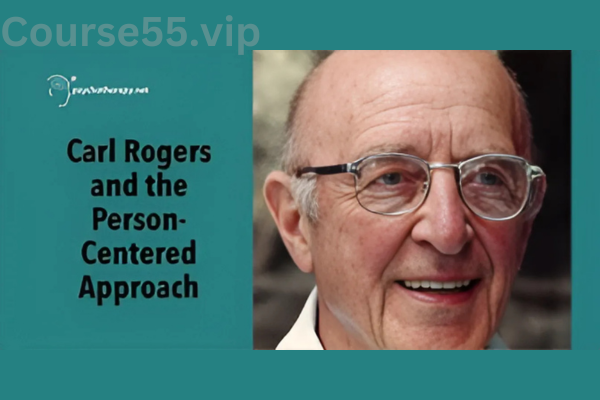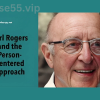Carl Rogers and the Person – Centered Approach With Carl Rogers
$29.00 Original price was: $29.00.$7.70Current price is: $7.70.
Carl Rogers and the Person-Centered Approach – Digital Download!

Carl Rogers and the Person – Centered Approach With Carl Rogers
Overview

Carl Rogers and the Evolution of the Person-Centered Approach
Carl Rogers, a towering figure in modern psychology, played a pivotal role in crafting a therapeutic model that champions the innate potential within every person. Born on January 8, 1902, in the quiet town of Oak Park, Illinois, Rogers’s path to psychology was anything but conventional. Initially pursuing studies in agriculture, he later pivoted toward psychology—a decision that would profoundly alter the future of therapy. Completing his Ph.D. in clinical psychology at Columbia University in 1931, Rogers laid the groundwork for what would become a major movement in humanistic psychology. Centered on concepts like respect, empathy, and unconditional acceptance, his approach provided a fresh framework for therapy that focused on nurturing the individual’s potential.
His model, known as the person-centered approach (PCA), rests on the belief that every human being harbors a natural impulse toward self-actualization. According to Rogers, individuals inherently strive to realize their highest capacities. Therapy, in his view, was less about diagnosis and intervention and more about creating an atmosphere where people feel unconditionally valued. Core principles such as empathy, genuineness, and unconditional positive regard are intricately woven into this relational model, serving as the foundation for a supportive therapeutic environment.
Carl Rogers’s Early Life and Intellectual Foundations
From modest beginnings, Rogers’s academic and personal journey reflected his evolving passion for understanding the human psyche. His initial foray into agriculture hints at his early interest in nurturing growth—a theme that would later characterize his psychological theories. Over time, Rogers became a pioneer not only in clinical settings but also in reaching individuals yearning for acceptance and self-understanding. His move toward psychology was motivated by a deeper search for insights into human experiences, culminating in advanced studies at Columbia University where he delved into the dynamic between therapist and client.
Educational Path
-
First Academic Pursuits:
Rogers’s original focus on agriculture mirrors his interest in cultivation—both literal and metaphorical. -
Transition to Psychology:
His shift to psychology exemplifies his openness to exploring human emotion and interpersonal relationships. -
Doctoral Achievement:
Earning his Ph.D. in 1931, Rogers embarked on a lifelong mission to understand human potential through empathetic therapeutic practice.
Rogers’s philosophy stressed that healing goes beyond simply solving problems—it involves creating a nurturing environment where self-growth can naturally occur. His focus on building genuine, compassionate relationships remains influential in psychological practices today.
Core Principles of the Person-Centered Approach
At the heart of Rogers’s contributions are several foundational concepts that illuminate the mechanics of the person-centered method. These key ideas underpin an approach that has forever shaped the discipline of psychology.
- Self-Actualization
Central to PCA is the belief that each person has an inherent drive to maximize their potential. Much like a seed naturally aspires to grow into a towering tree, individuals are propelled by an internal urge to evolve and flourish. Rogers believed the therapist’s primary role was to support this unfolding process. - Unconditional Positive Regard
Imagine being welcomed without any strings attached—accepted for your true self. This powerful concept, known as unconditional positive regard, is vital to Rogers’s vision. By fostering an atmosphere free of judgment, therapists empower clients to explore their inner world openly, leading to deeper self-awareness and authenticity. - Empathy and Congruence
Empathy acts as the bridge to deep understanding within the therapeutic alliance. When therapists genuinely endeavor to grasp their clients’ experiences, they create a healing bond. Congruence—where therapists remain transparent and sincere—further builds trust, making it safe for clients to share vulnerable emotions. This authentic dynamic lays the groundwork for profound personal growth. - Therapeutic Relationship
The interaction between therapist and client holds a place of prime importance. A relationship rooted in equality and mutual respect becomes a catalyst for exploration and self-healing.
The combination of these concepts creates an environment where clients can safely examine their thoughts and emotions, ultimately fostering pathways to transformation and self-realization.
Therapeutic Techniques Inspired by Rogers
Rogers’s methods stood apart from conventional psychotherapy by introducing a client-led, non-directive style. This fresh perspective positioned the client as the expert in their own life journey.
Non-Directive Therapy
In a typical person-centered session, the therapist assumes a facilitative role rather than directing the conversation. By providing a safe and accepting space, therapists enable clients to explore their feelings autonomously. This contrasts sharply with traditional models where therapists diagnose and advise, highlighting Rogers’s deep respect for individual agency.
Session Framework
Sessions within the PCA model are tailored around the client’s needs:
-
Client-Directed Dialogue: Conversations revolve around the client’s internal experiences, encouraging self-guided exploration.
-
Emergent Insights: Clients often arrive at significant realizations naturally, discovering new patterns and perspectives without external imposition.
Wider Applications
Thanks to its adaptable nature, Rogers’s model extends across various environments:
-
Individual Therapy: Offers personalized growth opportunities.
-
Group Therapy: Encourages shared emotional exploration and collective support.
-
Educational Settings: Promotes classrooms that prioritize emotional safety and authentic communication.
-
Organizational Development: Enhances team dynamics and workplace communication.
The versatility of Rogers’s framework has allowed it to influence multiple disciplines, reinforcing its value well beyond clinical therapy.
Broader Impact of the Person-Centered Approach
The reach of Carl Rogers’s philosophy extends across many sectors, demonstrating the broad utility of the person-centered method.
- Counseling Practices
Rogers’s insights transformed counseling into a more empathetic, client-driven practice, urging professionals to adopt non-judgmental attitudes that foster trust. - Social Work
The principle of unconditional acceptance harmonizes with social work’s mission to support and uplift clients from a place of compassion and understanding. - Educational Systems
Educators inspired by PCA create classrooms where students feel emotionally secure and empowered to express themselves, leading to richer learning experiences. - Conflict Resolution
By emphasizing empathy and perspective-taking, PCA has found a place in mediation efforts, helping parties resolve disputes more amicably.
Rogers’s approach continues to offer tools for building healthier, more empathetic relationships across varied contexts.
Seminal Works by Carl Rogers
Rogers’s groundbreaking ideas are immortalized in several major publications, each shedding light on different aspects of his theories:
-
“Client-Centered Therapy” (1951):
A foundational text explaining the theoretical underpinnings and practical application of PCA. -
“On Becoming a Person” (1961):
A deeply personal collection of essays encouraging individuals to embrace authenticity in the pursuit of psychological growth. -
“A Way of Being” (1980):
A reflective look at Rogers’s lifelong exploration of human relationships, integrity, and personal development.
These key works remain essential reading for those seeking to understand or implement the person-centered approach in their personal or professional lives.
Additional Resources and Further Exploration
For those eager to dive deeper into Rogers’s legacy and the PCA model, numerous valuable resources are available:
Books:
-
Rogers, C. (1951). Client-Centered Therapy: Its Current Practice, Implications and Theory. Houghton Mifflin.
-
Rogers, C. (1961). On Becoming a Person: A Therapist’s View of Psychotherapy. Houghton Mifflin.
-
Rogers, C. (1980). A Way of Being. Houghton Mifflin.
Articles and Academic Journals:
-
The Journal of Humanistic Psychology often features articles exploring Rogers’s theories and modern applications.
-
Academic databases like PsycINFO and Google Scholar provide access to a wealth of research on PCA.
Institutes and Organizations:
-
The Carl Rogers Institute for the Study of Personality and the Person-Centered Approach offers extensive training, workshops, and educational materials dedicated to advancing Rogerian principles.
Closing Thoughts
In conclusion, Carl Rogers’s person-centered approach remains a bedrock of modern psychological and therapeutic practice. By focusing on empathy, genuine connection, and the belief in each individual’s potential for growth, Rogers revolutionized the way therapy is understood and practiced. His enduring legacy invites us to look inward, to cultivate compassion for ourselves and others, and to embrace the lifelong journey of self-actualization and personal fulfillment.
Frequently Asked Questions:
Business Model Innovation: We operate a group buying strategy, allowing participants to share costs and access popular courses at reduced prices. This model benefits individuals with limited financial resources, despite concerns from content creators about distribution methods.
Legal Considerations: The legality of our operations involves complex issues. Although we don’t have explicit permission from course creators to resell their content, there are no specific resale restrictions stated at the time of purchase. This ambiguity creates an opportunity for us to provide affordable educational resources.
Quality Control: We ensure that all course materials purchased are identical to those offered directly by the creators. However, it’s important to understand that we are not official providers. As such, our offerings do not include:
– Live coaching calls or sessions with the course author.
– Access to exclusive author-controlled groups or portals.
– Membership in private forums.
– Direct email support from the author or their team.
We aim to reduce the cost barrier in education by offering these courses independently, without the premium services available through official channels. We appreciate your understanding of our unique approach.
Be the first to review “Carl Rogers and the Person – Centered Approach With Carl Rogers” Cancel reply
You must be logged in to post a review.

 Attachment Focused Therapy: Trauma Related Disorders in Children & Adolescents By Daniel Hughes - PESI
Attachment Focused Therapy: Trauma Related Disorders in Children & Adolescents By Daniel Hughes - PESI 














Reviews
There are no reviews yet.